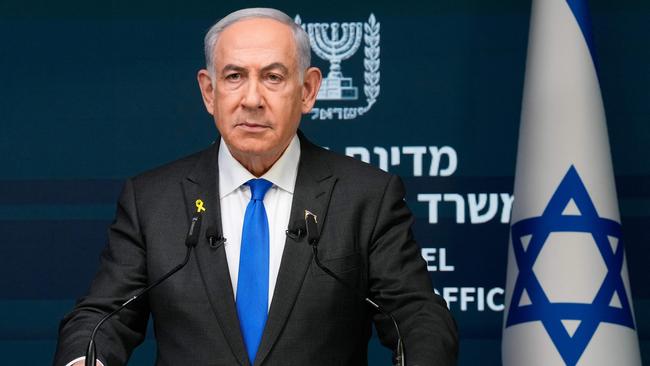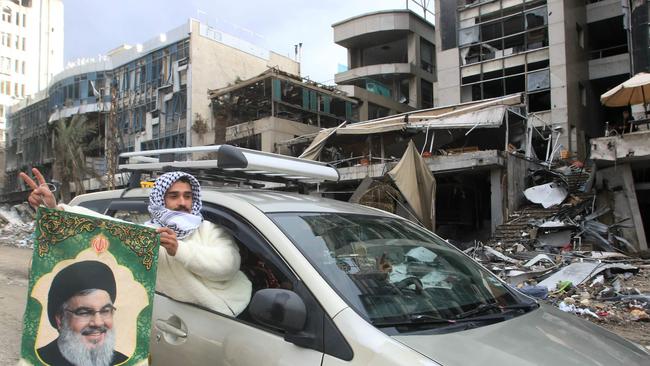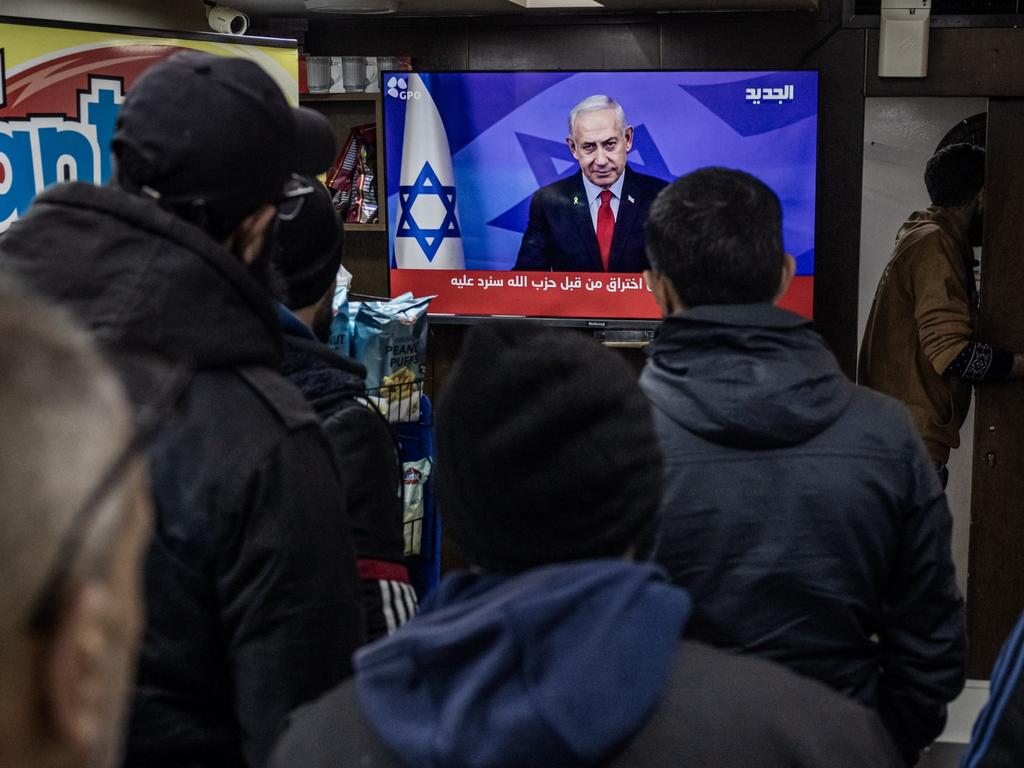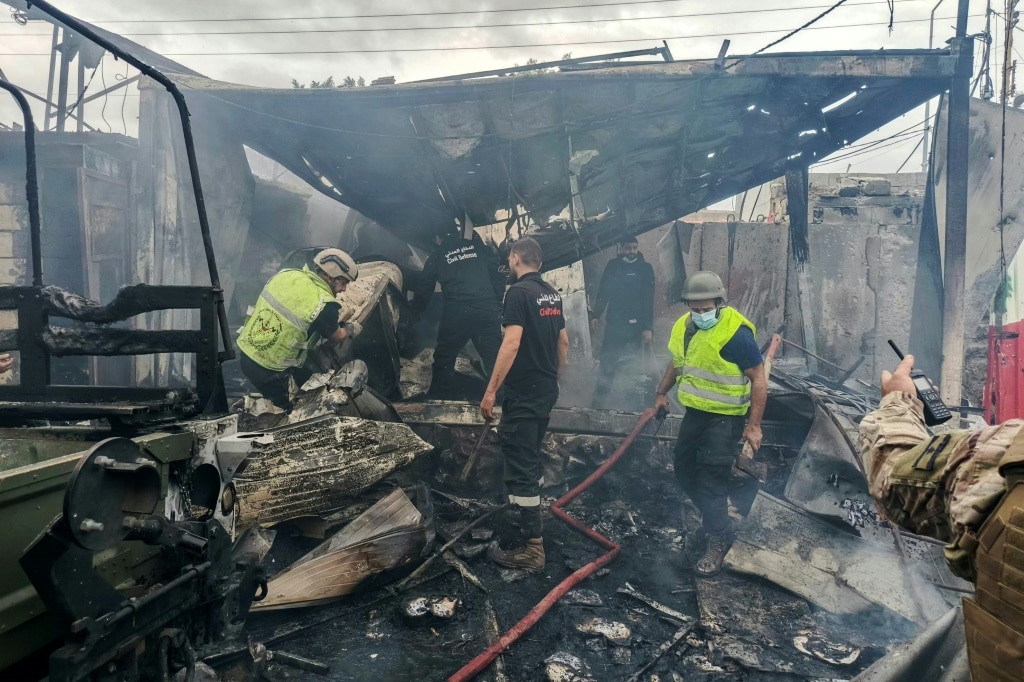Hezbollah truce opens a pathway to war’s end for Israel
In defiance of premature ceasefire calls, Israel has brought one of the world’s most feared terrorist groups to its knees and changed the Middle East’s strategic landscape.

Through brute strength and determination, and in defiance of premature ceasefire calls from Australia to the US, Israel brought one of the world’s most feared terrorist groups to its knees.
Hezbollah’s signing of a 60-day ceasefire from a position of desperation – effectively abandoning a low-level war on Israel that it started, and also abandoning its terror partner Hamas in Gaza – is the formal culmination of an astonishing reversal of fortune for Israel. It marks the dawn of a new era of strategic dominance for the Jewish state in the Middle East.
Consider the change. Almost 14 months ago, on October 8 last year, Israelis were in a foetal position, heartbroken by the unspeakable losses in the Hamas massacre a day earlier.
They were surrounded on the southwest by Hamas, which had just slaughtered 1200 of their fellow citizens; in the north by a heavily armed Hezbollah, which immediately started lobbing missiles from Lebanon into Israel in solidarity with Hamas; and in the east by a belligerent and supremely confident Iran that was licking its lips at the potential to bring down or severely weaken its wounded enemy.
Today, that grim strategic landscape for Israel has been utterly transformed. Hamas in Gaza has been completely destroyed as a coherent military force. The terror group has been reduced to handfuls of rag-tag militants, able to do no more than random small-scale attacks on Israeli forces. Hamas’s days as a strategic player in Gaza and the region are over.
The once-feared Hezbollah has been brought to its knees by a stunningly effective 2½-month offensive by Israel in Lebanon that decapitated its leadership and ruined its much-vaunted arsenal of missiles. It was a broken Hezbollah that came crawling to Israel to sign this week’s ceasefire deal, an agreement that was a defeat for the terror group in all but name.
Watching all of this to the east, Iran has blinked. Having launched two failed strikes against Israel this year and seeing its beloved terror-proxy in Lebanon dismantled, Tehran suddenly has no stomach for conflict with an Israel that it now knows has the capacity to assassinate its leaders and destroy any of its military bases with a single targeted strike.
No wonder Israeli Prime Minister Benjamin Netanyahu said this week: “Only three months ago, this all would have sounded like science fiction. This is no longer the same Hezbollah. We set it back decades.”
Yet the signing of the 60-day ceasefire now raises a new series of critical questions.
First, can Hezbollah be trusted to stick to the terms of the deal or will it be a matter of time before hostilities are resumed?
Second, how will Iran’s terror apparatus across the Middle East respond to the effective defeat of its most prized terror proxy?
Third and most important, what will this mean for the prospects of a ceasefire deal in Gaza and the potential release of the roughly 60 Israeli hostages still believed to be alive?
For the hardline Netanyahu, the ceasefire deal with Hezbollah is unusual because he has pushed it through despite flak from militant far-right elements of his ruling coalition. The argument made by those such as National Security Minister Itamar Ben-Gvir was that the ceasefire robbed Israel of the opportunity to keep pursuing Hezbollah to destroy it entirely.
But Netanhayu says Hezbollah will take at least 20 years to recover from the damage Israel has already inflicted. Israeli intelligence sources say 70 per cent to 80 per cent of the group’s missiles and rockets have been destroyed.
To continue to pursue Hezbollah would have been a brazen case of mission creep given that Israel launched its air and ground offensive against the group in September with the stated singular aim of creating the safe conditions for the 60,000 Israelis displaced by more than a year of Hezbollah’s bombing to return to their homes in Israel’s north.
Any further pursuit of Hezbollah inevitably would have led to a steep rise in civilian casualties in Lebanon and broader destruction across the country given that the Israel Defence Forces had already attacked the Hezbollah targets that were easiest to hit in its bombing campaign.
What’s more, Hezbollah as an entity is more than a militant force – it is also a political party and a provider of social services that unfortunately is woven into the fabric of Lebanese society and cannot be eradicated by missiles alone.
As former chief of Israel’s Mossad intelligence service Zohar Palti told Inquirer this week, Israel has no quarrel with the people of Lebanon and no designs on Lebanese territory.
He says his country’s singular aim is to stop Hezbollah threatening Israel and its people. “We have no interest in staying in Lebanon. Remember, it was Hezbollah that started this war on October 8 by challenging us,” Palti said from the sidelines of the Canberra-Jerusalem Strategic Dialogue in Canberra this week.
“It was time to wrap it up. Hezbollah understood that we had the upper hand from both a technological and intelligence point of view. This ceasefire allows us to finish with the northern arena and focus on how to close the war in Gaza and bring our people back home.”
US President Joe Biden says the initial 60-day ceasefire, during which Hezbollah will move out of southern Lebanon to the north and Israeli forces will depart southern Lebanon to the south, is designed to morph into a permanent peace.
But some sceptics wonder if Hezbollah has the discipline to stick to the terms of this ceasefire.
Israelis remember that Hezbollah ultimately breached a similar ceasefire that was adopted in 2006, when UN Security Council Resolution 1701 called for Hezbollah to leave southern Lebanon.
Instead, the terror group slowly rebuilt its military apparatus in the south in defiance of the UN.
Israel’s pre-eminent military analyst, Ehud Yaari of the Washington Institute, welcomes the ceasefire but warns that the deal could be breached. “The agreement is full of holes, like a slice of Swiss cheese,” he tells Inquirer.
Yaari is sceptical about the effectiveness of the new US-led implementation body aimed at ensuring Hezbollah does not break the agreement, as it did last time.
He says Israel was too passive previously in allowing Hezbollah to rebuild its arsenal and that it must be more aggressive this time.
“If Israel can police it then the ceasefire agreement can hold for years because Hezbollah has been severely beaten,” he says. “But if Israel is again passive and is willing to watch Hezbollah try to return to the south, then in 10 years we will be back at the same situation.”
Netanyahu says Israel will not hesitate to attack if Hezbollah breaks the agreement.
But most experts say the chances are higher this time that Hezbollah will stick to the agreed terms and not provoke Israel. Why? Because Hezbollah knew it was clearly losing the fight with Israel and that a resumption of hostilities in the months ahead would only weaken it further.
Hezbollah’s puppet master, Iran, sanctioned the organisation’s signing of the ceasefire because it wants to keep at least part of its terror proxy intact, giving it a base to slowly rebuild it in the years ahead.

Hezbollah’s sudden and unexpected defeat – caused primarily by astonishingly effective Israeli intelligence-led attacks on the leadership of the terror group via booby-trapped pagers and walkie-talkies and the assassination of longtime leader Hassan Nasrallah and his successors – has severely damaged Iran’s regional clout.
“Iran now knows that the huge investments worth dozens of billions of dollars that they have put into Hezbollah over the past two or three decades has been lost,” says Yaari.
“They have to think now whether they want to send good money after bad money. The organisation is not what it was, but if they want to retain Hezbollah as an asset, and as a major player in Lebanese domestic politics, they will need to give it time to recover.”
With a severely weakened Hezbollah, the hardline clerical regime, already beset by economic woes and unpopularity at home, will be even more reluctant to challenge a clearly ascendant Israel. It will be wary of asking its militias in Syria, Iraq and Yemen to launch missiles at Israel knowing that Israel has the power to strike back at Iran directly.
The outlook for Iran is likely to worsen further given that in less than two months Donald Trump will be US president having campaigned on a pledge to take a harder line against the regime than Biden ever did.
But the key question is how the Hezbollah ceasefire deal affects the prospects for an overdue end to hostilities in Gaza.
For months now Hamas and Netanyahu have danced around the concept of a ceasefire in Gaza in return for a prisoner swap in which at least some of the remaining Israeli hostages would be released. But neither party has shown commitment to the deal, with both putting up unrealistic obstacles to any agreement.
During this time Israel has continued to pound what remains of Hamas in northern Gaza as the excessive civilian death toll and the devastating humanitarian crisis there continue to grow.
The main sticking point has been Hamas’s insistence that all Israeli forces withdraw from Gaza, while Netanyahu has insisted that Israel keep troops in Gaza and reserve the right to use force if required.
But the ceasefire with Hezbollah will put greater pressure on all parties to reach a deal. For Hamas, the capitulation of Hezbollah has left it abandoned by its terrorist comrades in the region and the ceasefire in Lebanon will release more Israeli troops to fight in Gaza.
Hamas has lost its leadership and most of its fighters. The reasons for it to continue to fight on are fast diminishing.
Hamas claims in the wake of the Israel-Hezbollah ceasefire agreement that it will “co-operate with any efforts” to bring an end to the war in Gaza, saying “we are interested in stopping the aggression against our people”. But Hamas has not publicly stated its final negotiating position.
Biden says Hamas repeatedly has held up progress towards a ceasefire by refusing to negotiate “in good faith”.
“Now Hamas has a choice to make. Their only way out is to release the hostages,” he says.
From Netanyahu’s perspective, the end of the Lebanon conflict will intensify the pressure on him to reach a deal in Gaza, especially from the families of the remaining hostages.
But so far Netanhayu has displayed little enthusiasm for a deal, and Israeli insiders have told US media that “Netanyahu is the problem” to securing a final agreement.

Israeli ambassador to Australia, Amir Maimon, says people need to understand that Israel will never agree to a ceasefire deal that does not include the release of the hostages.
“It is very important for me to convey that Israel will not accept a ceasefire agreement in Gaza unless it includes the immediate release of the 101 hostages,” Maimon tells Inquirer. “Some people suggest that first we should have a ceasefire and only then do we start negotiating the release of the remaining hostages. It will never, never happen.”
For Biden, the securing of a ceasefire and hostage deal before he leaves office on January 20 would give him a legacy he desperately wants after a disappointing presidency and an election loss for his Vice President, Kamala Harris. Biden insists the US will “make another push” to reach a deal to end the war.
But he also called on Israel, which “has been bold on the battlefield”, to now “be bold in turning tactical gains against Iran and its proxies into a coherent strategy”.
In short, Biden wants Netanyahu to use his victory against Hezbollah to pursue the endgame in its war against Hamas in Gaza and secure the release of the remaining hostages. It’s the most difficult challenge of all for Israel, but it’s one many Israelis believe can now be tackled head-on.
Palti, the former Mossad chief, says that given the ceasefire with Hezbollah, “our government now has a moral obligation to bring our people back home”.
“This is the most important mission we now have as a democratic country,” he says. “We blew it on October 7, so there is a lot of responsibility on the Israeli government to get it right now and bring them back home.”







Israel altered the strategic landscape of the Middle East this week, not just for a few years but most likely for decades.